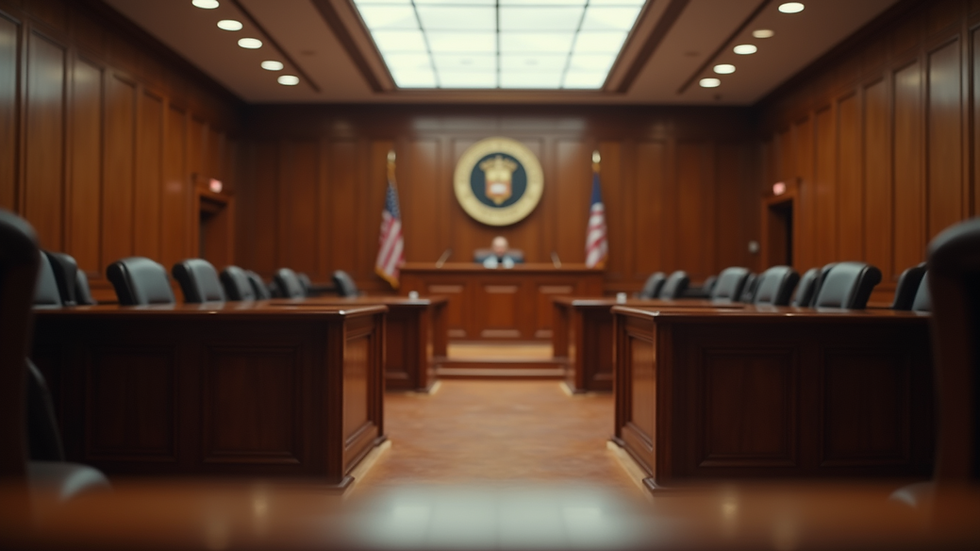Expert Witness Services: What to Expect in Legal Cases
- Stephen Griffith, MD
- 2 days ago
- 4 min read
In the intricate world of legal proceedings, expert witnesses play a pivotal role. They provide specialized knowledge that can significantly influence the outcome of a case. Whether you are a lawyer, a client, or simply someone interested in the legal system, understanding what to expect from expert witness services is crucial. This post will guide you through the essential aspects of expert witness services, including their roles, the selection process, and how they can impact legal cases.

Understanding the Role of Expert Witnesses
Expert witnesses are individuals with specialized knowledge, skills, or experience in a particular field relevant to a legal case. Their primary function is to provide testimony that helps clarify complex issues for the judge and jury. Here are some key points about their role:
Specialization: Expert witnesses often come from various fields, including medicine, engineering, finance, and psychology. Their expertise allows them to explain intricate concepts in a way that is understandable to those without specialized knowledge.
Objective Testimony: Unlike fact witnesses who recount events they have personally observed, expert witnesses provide opinions based on their expertise. Their testimony is intended to assist the court in understanding the evidence and making informed decisions.
Preparation and Research: Before testifying, expert witnesses conduct thorough research and analysis related to the case. This preparation ensures that their opinions are well-founded and credible.
The Selection Process for Expert Witnesses
Choosing the right expert witness can be a critical factor in the success of a case. Here are the steps involved in selecting an expert witness:
Identify the Need: Determine the specific area of expertise required for your case. This could range from medical malpractice to accident reconstruction.
Research Potential Experts: Look for professionals with relevant qualifications, experience, and a strong reputation in their field. Online databases, professional associations, and referrals from colleagues can be valuable resources.
Evaluate Credentials: Review the expert's education, certifications, and previous experience as a witness. Consider their track record in court, including any past testimonies and the outcomes of those cases.
Conduct Interviews: Meet with potential experts to discuss the case and assess their communication skills. An effective expert witness must be able to convey complex information clearly and persuasively.
Check References: Speak with previous clients or attorneys who have worked with the expert to gauge their reliability and effectiveness in court.
Preparing an Expert Witness for Testimony
Once an expert witness is selected, preparation is key to ensuring their testimony is impactful. Here are some steps to prepare an expert witness:
Review Case Materials: Provide the expert with all relevant case documents, including pleadings, depositions, and evidence. This helps them understand the context and specifics of the case.
Outline Key Points: Work with the expert to outline the main points they will address during their testimony. This ensures that their opinions are focused and relevant.
Mock Testimony: Conduct practice sessions where the expert can rehearse their testimony. This helps them become comfortable with the courtroom environment and anticipate potential questions.
Discuss Courtroom Etiquette: Educate the expert on courtroom procedures and expectations. This includes how to address the judge, respond to questions, and maintain professionalism.
The Impact of Expert Witnesses on Legal Cases
The presence of an expert witness can significantly influence the outcome of a case. Here are some ways they can impact legal proceedings:
Clarifying Complex Issues: Expert witnesses can simplify complicated topics, making them accessible to jurors and judges. This clarity can be crucial in persuading the court.
Establishing Credibility: A well-respected expert can lend credibility to a case. Their reputation and expertise can sway opinions and reinforce the arguments presented by the legal team.
Challenging Opposing Testimony: Expert witnesses can also be used to counter the testimony of opposing experts. By providing alternative viewpoints or highlighting flaws in the opposing expert's methodology, they can strengthen a case.
Influencing Settlement Negotiations: The potential impact of an expert witness's testimony can lead to more favorable settlement negotiations. If one side believes that the expert's testimony will be compelling, they may be more inclined to settle rather than risk a trial.
Common Fields of Expertise for Expert Witnesses
Expert witnesses can come from a wide range of fields. Here are some common areas of expertise:
Medical Experts: Often used in personal injury and malpractice cases, medical experts provide insights into injuries, treatment protocols, and standards of care.
Forensic Experts: These experts analyze physical evidence, such as fingerprints, DNA, and ballistics, to assist in criminal cases.
Financial Experts: In cases involving financial disputes, such as fraud or business valuation, financial experts can provide analysis and testimony regarding economic issues.
Engineering Experts: In construction or accident cases, engineering experts can evaluate design flaws, safety standards, and accident reconstruction.
Challenges Faced by Expert Witnesses
While expert witnesses play a vital role in legal cases, they also face several challenges:
Cross-Examination: Expert witnesses must be prepared for rigorous questioning from opposing counsel. Effective cross-examination can undermine their credibility and the weight of their testimony.
Bias Perception: Experts may be perceived as biased if they are frequently hired by one side. This perception can affect how their testimony is received by the court.
Complexity of Testimony: Experts must balance providing detailed information with the need to keep their testimony understandable. Overly technical language can alienate jurors.
Conclusion
Expert witness services are an essential component of the legal system, providing valuable insights that can shape the outcome of cases. By understanding the role of expert witnesses, the selection process, and the impact they can have, legal professionals and clients can better navigate the complexities of the courtroom. As you prepare for your next legal challenge, consider the importance of expert witnesses and how they can support your case.
Whether you are a lawyer seeking to enhance your case or a client looking to understand the process, knowing what to expect from expert witness services can make all the difference.


Comments